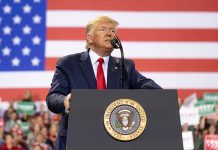
Telegram CEO Pavel Durov’s arrest in France has ignited a firestorm of controversy, raising questions about digital privacy and international relations.
At a Glance
- Pavel Durov, CEO of Telegram, was detained at Paris-Le Bourget Airport on an arrest warrant
- The warrant alleges Telegram has been used for money laundering, drug trafficking, and other offenses
- Durov’s arrest has sparked diplomatic tensions between Russia and France
- Elon Musk and others in the tech community have voiced support for Durov
- The incident highlights ongoing debates about free speech, censorship, and government oversight of online platforms
Arrest Details and Allegations
Pavel Durov, the founder and CEO of the popular messaging app Telegram, was apprehended at Paris-Le Bourget Airport on an arrest warrant. The National Anti-Fraud Office, part of the French customs department, placed Durov in police custody after he arrived from Azerbaijan. Durov, who holds dual citizenship in France and Russia, faces allegations that Telegram has been used for illegal activities including money laundering and drug trafficking.
The warrant was issued by France at the request of a special unit investigating crimes against minors, including online sexual exploitation. French prosecutors have declined to comment on the arrest, citing ongoing investigation regulations. This development has raised concerns about the responsibility of platform owners for user-generated content and the balance between free speech and law enforcement.
BREAKING: #Telegram CEO Pavel Durov arrested by French authorities.
Early official comments to French media suggest this follows from France's displeasure with Telegram's moderation & compliance with official requests(?).
If so, I'm pretty sure this is an unprecedented action… pic.twitter.com/hKa1Ip0buD
— John Scott-Railton (@jsrailton) August 24, 2024
International Reactions and Diplomatic Tensions
The arrest of Durov has strained diplomatic relations between Russia and France. Russian officials have criticized the arrest, accusing France of applying a double standard on freedom of speech. The Russian Embassy in Paris has requested access to Durov, but French authorities are prioritizing his French citizenship in this matter.
“It is absurd to claim that a platform or its owner are responsible for abuse of that platform,” Telegram’s post said. “Almost a billion users globally use Telegram as means of communication and as a source of vital information. We’re awaiting a prompt resolution of this situation. Telegram is with you all.”
The tech community has also responded to Durov’s arrest. Elon Musk, known for his stance on free speech, posted “#freePavel” on his X (formerly Twitter) account in support of Durov. Musk further commented, “It’s 2030 in Europe and you’re being executed for liking a meme,” highlighting concerns about potential overreach in content moderation and digital rights.
Telegram’s Role and Controversies
Telegram, founded by Durov and his brother in 2013, has grown to over 900 million users worldwide. The platform gained popularity for its pro-privacy stance and has become a significant source of unfiltered content, particularly about the Russia-Ukraine war. However, this commitment to free speech and light oversight has also led to criticism from Western governments for facilitating the spread of disinformation and extremist content.
“I would rather be free than to take orders from anyone,” Durov said in April about his exit from Russia and search for a home for his company which included stints in Berlin, London, Singapore and San Francisco.
The platform has faced regulatory challenges in various countries. Germany fined Telegram operators in 2022 for non-compliance with German law, and Brazil temporarily suspended the app last year for not providing data on neo-Nazi activity. Despite these issues, Telegram remains widely used in Russia, Ukraine, and India, serving as a crucial communication tool and news source in regions with limited press freedoms.
Implications for Digital Privacy and Free Speech
Durov’s arrest underscores the ongoing global debate about digital privacy, free expression, and government oversight of online content. As regulatory scrutiny of online speech intensifies, particularly in the European Union, platforms like Telegram find themselves at the center of discussions about balancing user privacy with the need to combat illegal activities and protect vulnerable groups online.
French authorities arrest Telegram CEO Pavel Durov at a Paris airport, French media report https://t.co/f6sMM5EiF7 pic.twitter.com/AYHacuNXN4
— Eyewitness News (@ABC7NY) August 26, 2024
The incident has also had economic repercussions, with Toncoin, a cryptocurrency associated with Telegram, dropping 13% in value following Durov’s arrest. This highlights the interconnectedness of digital platforms, cryptocurrencies, and global finance in today’s tech landscape.
As the situation unfolds, it remains to be seen how this high-profile case will impact international relations, the tech industry, and the future of digital communication platforms. The global community will be watching closely to see how France navigates the complex issues of platform responsibility, user privacy, and international cooperation in the digital age.
Sources
- French authorities arrest Telegram CEO Pavel Durov at a Paris airport, French media report
- Telegram messaging app CEO Durov reportedly arrested in France
- Telegram Becomes Free Speech Flashpoint After Founder’s Arrest
- Telegram founder Pavel Durov detained in France
- Telegram Becomes Free Speech Flashpoint After Founder’s Arrest














